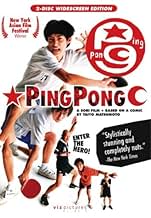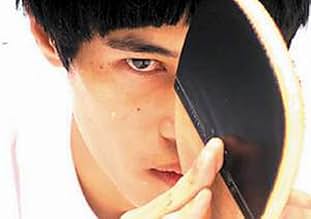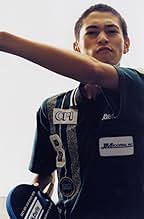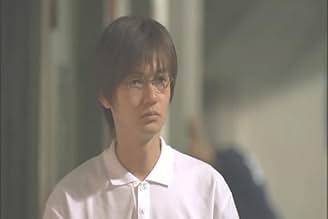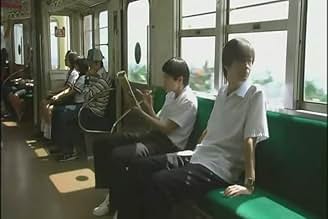Pinpon
- 2002
- 1h 54min
CALIFICACIÓN DE IMDb
7.0/10
3.6 k
TU CALIFICACIÓN
Los amigos de la infancia Smile y Peco, compiten en un torneo de ping pong de alta apuesta. La humildad de Smile choca con la determinada ambición de Peco mientras superan obstáculos y poten... Leer todoLos amigos de la infancia Smile y Peco, compiten en un torneo de ping pong de alta apuesta. La humildad de Smile choca con la determinada ambición de Peco mientras superan obstáculos y potencialmente se enfrentan en la final.Los amigos de la infancia Smile y Peco, compiten en un torneo de ping pong de alta apuesta. La humildad de Smile choca con la determinada ambición de Peco mientras superan obstáculos y potencialmente se enfrentan en la final.
- Premios
- 6 premios ganados y 7 nominaciones en total
Arata Iura
- Makoto Tsukimoto
- (as Arata)
- …
- Dirección
- Guionistas
- Todo el elenco y el equipo
- Producción, taquilla y más en IMDbPro
Opiniones destacadas
"[...]transcendent moments are in short supply these days."
--Martin Scorsese, on Wes Anderson
At first I was very skeptical about this movie, because the ads made it sound like a shaolin soccer ripoff, you know, a movie that takes a normal sport to a comically extreme level or something. Then I realized the movie was nothing like that--it didn't really have any of that over the top cg or any of that ingenious mo lit tao (an asian "nonsensical/ absurdist" type comedy, kinda neo-Groucho Marxian I guess) comedy of Stephen Chow. It was simply a very down to earth sports movie. what makes it so good? first and foremost, the characters. The movie depicts the relationship between two high school guys on the ping pong team--Peco and smile. Peco is the crazy genius ping pong player seen beating some college champ for money in the first scene, while Smile ("they call him that because he never does") his nerdy awkward buddy who envies Peco's talent. Peco's dream is to be the best ping pong player "on the planet" while Smile just wants to play for fun. But then we realize that maybe Peco isn't so good after all, and maybe Smile is the real genius who concedes on purpose because he just wants to play for fun, not for victory.
Then there is the hot shot player from Shanghai (hong kong's Sam Lee of Gen-X Cops); the militant, all-bald rival ping pong team dressed in all black; the crazy granny with her own "ping pong dojo" and a frustrated coach named "Butterfly Joe"--all of them sounding like real familiar sports movie archetypes, but there is a twist at the end of every scene, when we realize that they are a lot more human than anything we've seen in a long time. For instance, the Shanghai hotshot is under constant stress because he knows he's just a failed junior national player in China, playing against Japanese high school kids to feed his own complex ("I coulda gone to Germany, I coulda gone to Sweden..." he keeps on telling himself). And ironically, these are orginally comicbook characters.
The actors are really good--probably too old for high school roles, but they display a real innocence, and that makes you forget that the main guy's got smoker's teeth of a 25-year old. The little kids that play the younger version of the high school characters are especially nice. My favorite parts of the movie are the flashback sequences interspersed throughout the movie when Smile keeps on remembering a young Peco with the mask of a popular manga robot hero from the 60's, proclaiming "enter the hero!" in front of a temple. Those kids are so natural, and so confident, but not jaded like those TV kids. Either that or they are so jaded they are fooling me.
The music is good too, just like the rest of the movie, it has a real innocence about it. it's just catchy electronic pop, but never crosses the line to being stupid or bad or cheesy pop, at least not in the context of the film. The energy is high, and it attacks in short assaults--it comes in, drops out before you realize it, then attacks again. Half of the movie is carried through ambient noises, but the sound design does an excellent job of creating that sense of rhythm in a ping pong hall, between the cheers and the conversations, just a symphony of crispy ping pong sounds, layered with heavy breathing and the echoy sneakers. It is intense.
The style in which the movie's shot is real flashy, a lot of handheld work, mixed with a lot of crane. in fact, I don't think the movie used a dolly or steadicam at all--when the camera is not flying up and around the characters, it's following them step by step via handheld. and between all the cool extreme closeups and quick cuts, it also reminds you that this is a Japanese film by pulling all the way back and leave the characters on screen doing about their thing, free of extradiagetic sounds or any medium shots, Ozu-style. it's flashy but never obtrusive. I don't think there was any quick cut simply for the sake of showing off, but to simply elevate the tension of a ping pong game. there were some lengthy takes on the crane of two players going at it, uncut, with the assistance of some nice CG to show off the long takes, but those didn't last too long, and I think that's the only instance of showing off I can remember. and showing off isn't even a real crime, just a minor petty nit petty petty pick.
This movie reminds me in a lot of ways of Inoue's Slam Dunk, where gifted (and soulful) high school jocks center their lives around the sports, and the comedy and the drama just comes from how easily they have it and the tension between them and other people who try and try but just don't got it (but the story doesn't side with either of the party in these two instances). However, while Slam Dunk packs the plot and character development so tightly within the basketball games, where every point seems life and death--Ping Pong really isn't concerned about the games, and the message of the movie seems to be reminding us that hey, it's just a game, a beautiful, transcendent game.
--Martin Scorsese, on Wes Anderson
At first I was very skeptical about this movie, because the ads made it sound like a shaolin soccer ripoff, you know, a movie that takes a normal sport to a comically extreme level or something. Then I realized the movie was nothing like that--it didn't really have any of that over the top cg or any of that ingenious mo lit tao (an asian "nonsensical/ absurdist" type comedy, kinda neo-Groucho Marxian I guess) comedy of Stephen Chow. It was simply a very down to earth sports movie. what makes it so good? first and foremost, the characters. The movie depicts the relationship between two high school guys on the ping pong team--Peco and smile. Peco is the crazy genius ping pong player seen beating some college champ for money in the first scene, while Smile ("they call him that because he never does") his nerdy awkward buddy who envies Peco's talent. Peco's dream is to be the best ping pong player "on the planet" while Smile just wants to play for fun. But then we realize that maybe Peco isn't so good after all, and maybe Smile is the real genius who concedes on purpose because he just wants to play for fun, not for victory.
Then there is the hot shot player from Shanghai (hong kong's Sam Lee of Gen-X Cops); the militant, all-bald rival ping pong team dressed in all black; the crazy granny with her own "ping pong dojo" and a frustrated coach named "Butterfly Joe"--all of them sounding like real familiar sports movie archetypes, but there is a twist at the end of every scene, when we realize that they are a lot more human than anything we've seen in a long time. For instance, the Shanghai hotshot is under constant stress because he knows he's just a failed junior national player in China, playing against Japanese high school kids to feed his own complex ("I coulda gone to Germany, I coulda gone to Sweden..." he keeps on telling himself). And ironically, these are orginally comicbook characters.
The actors are really good--probably too old for high school roles, but they display a real innocence, and that makes you forget that the main guy's got smoker's teeth of a 25-year old. The little kids that play the younger version of the high school characters are especially nice. My favorite parts of the movie are the flashback sequences interspersed throughout the movie when Smile keeps on remembering a young Peco with the mask of a popular manga robot hero from the 60's, proclaiming "enter the hero!" in front of a temple. Those kids are so natural, and so confident, but not jaded like those TV kids. Either that or they are so jaded they are fooling me.
The music is good too, just like the rest of the movie, it has a real innocence about it. it's just catchy electronic pop, but never crosses the line to being stupid or bad or cheesy pop, at least not in the context of the film. The energy is high, and it attacks in short assaults--it comes in, drops out before you realize it, then attacks again. Half of the movie is carried through ambient noises, but the sound design does an excellent job of creating that sense of rhythm in a ping pong hall, between the cheers and the conversations, just a symphony of crispy ping pong sounds, layered with heavy breathing and the echoy sneakers. It is intense.
The style in which the movie's shot is real flashy, a lot of handheld work, mixed with a lot of crane. in fact, I don't think the movie used a dolly or steadicam at all--when the camera is not flying up and around the characters, it's following them step by step via handheld. and between all the cool extreme closeups and quick cuts, it also reminds you that this is a Japanese film by pulling all the way back and leave the characters on screen doing about their thing, free of extradiagetic sounds or any medium shots, Ozu-style. it's flashy but never obtrusive. I don't think there was any quick cut simply for the sake of showing off, but to simply elevate the tension of a ping pong game. there were some lengthy takes on the crane of two players going at it, uncut, with the assistance of some nice CG to show off the long takes, but those didn't last too long, and I think that's the only instance of showing off I can remember. and showing off isn't even a real crime, just a minor petty nit petty petty pick.
This movie reminds me in a lot of ways of Inoue's Slam Dunk, where gifted (and soulful) high school jocks center their lives around the sports, and the comedy and the drama just comes from how easily they have it and the tension between them and other people who try and try but just don't got it (but the story doesn't side with either of the party in these two instances). However, while Slam Dunk packs the plot and character development so tightly within the basketball games, where every point seems life and death--Ping Pong really isn't concerned about the games, and the message of the movie seems to be reminding us that hey, it's just a game, a beautiful, transcendent game.
a terrific movie. i was surprised by how good and mature the screenplay was. the movie takes place in the world of high school ping pong, but really it's more of a human story about friendship and hero worshipping, and not living life like it's a curse. a good movie, highly recommended, even if you don't know a lick about ping pong (which pretty much sums up my experience).
There's a lot of great stuff coming from Japan these days and it's not on horror flicks about stylized spirits and discordant ghostly sounds. "Ping Pong" has something and it captures a feel that many people I know who have visited Japan felt on first viewing "Lost In Translation". It looks like Tokyo and it looks like hyper-real Tokyo at the same time.
But this is a very, very different story from "Lost In Translation". Based on a manga, this is a surreal and existential and neo-Zen comedy about the competitive world of young ping pong players in modern Japan. Peco and Smile are two players who have been friends since their youth. Peco (Yosuke Kubozuka of "Go" and "Tomie: Replay") is the brash and outrageous champion who crushes all opponents while rubbing their face in it. Smile (Arata from "Afterlife") is the better player (he's called Smile because he never does - Excellent!) but isn't especially interested and often loses on purpose to Peco out of some sort of loyalty. Not only does this anger his coach (a former ping pong star) but it gives Peco a further inflated ego.
During an inter-school competition, both are defeated. Peco loses to the champ of the disciplinarian, militaristic school of skinheads named Dragon (newcomer Shido Nakamura). Smile loses to China (Sam Lee of "Gen-X Cops" and "Public Toilet"), so named, as that's where he is a pro and he's just in Japan to kick start his career (sort of like when a ball player gets sent back down to the minors for a tune-up). Needless to say, the rest of the movie involves the two needing to pick themselves up off the floor solving the inequities of their friendship along the way. And of course, it all is heading back to a great rematch.
This is a lot of fun as the competitions are startling in their originality and quite beautiful at times. There are some amazing epiphanies from one character re-christening himself in a river, one of the skinheads getting his due and when Dragon learns to play ping pong completely for pleasure.
I'll also say this; the soundtrack is amazing. I don't know who any of these groups are. They're all Japanese. But we were all jumping up and down to the music the first time we saw it. If you have an all-region DVD player, I would suggest you get the Japanese disc as it comes with a feature where you can watch the whole movie with just the music soundtrack.
But this is a very, very different story from "Lost In Translation". Based on a manga, this is a surreal and existential and neo-Zen comedy about the competitive world of young ping pong players in modern Japan. Peco and Smile are two players who have been friends since their youth. Peco (Yosuke Kubozuka of "Go" and "Tomie: Replay") is the brash and outrageous champion who crushes all opponents while rubbing their face in it. Smile (Arata from "Afterlife") is the better player (he's called Smile because he never does - Excellent!) but isn't especially interested and often loses on purpose to Peco out of some sort of loyalty. Not only does this anger his coach (a former ping pong star) but it gives Peco a further inflated ego.
During an inter-school competition, both are defeated. Peco loses to the champ of the disciplinarian, militaristic school of skinheads named Dragon (newcomer Shido Nakamura). Smile loses to China (Sam Lee of "Gen-X Cops" and "Public Toilet"), so named, as that's where he is a pro and he's just in Japan to kick start his career (sort of like when a ball player gets sent back down to the minors for a tune-up). Needless to say, the rest of the movie involves the two needing to pick themselves up off the floor solving the inequities of their friendship along the way. And of course, it all is heading back to a great rematch.
This is a lot of fun as the competitions are startling in their originality and quite beautiful at times. There are some amazing epiphanies from one character re-christening himself in a river, one of the skinheads getting his due and when Dragon learns to play ping pong completely for pleasure.
I'll also say this; the soundtrack is amazing. I don't know who any of these groups are. They're all Japanese. But we were all jumping up and down to the music the first time we saw it. If you have an all-region DVD player, I would suggest you get the Japanese disc as it comes with a feature where you can watch the whole movie with just the music soundtrack.
I was incredibly lucky to get to view this on real film, and loved it. It turned the rather interesting sport of ping pong into a watchable, hyper, twisting story of friendship. I occasionally cried. The cinematography and special effects are splendid -- they bring it in touch with the manga it was based on, without making it inaccessibly over-produced. Also, the casting is fantastic; you can tell that the actors were type-cast, but the movie only seems to benefit from it. As others have mentioned, the soundtrack was excellent -- if Simon & Garfunkel and Japancakes collaborated on Asian pop, I think it would sound a lot like this. My only reservation is on the subbing; though it's better than dubbed would ever be, something is occasionally lost in translation when innocent phrases in Japanese end up translating into English as something connotatively very different.
This movie is a superb adaptation of the flabbergasting manga series by genius Taiyo Matsumoto; the director has truly made a tremendously good work! The actors are well-chosen and very good in their role, the picture is great (a "manga-style" centring, which is very interesting) and the story never gets boring, even if the film is over two hours.
I was impressed and have only very few negative comments to make, but I think they only concern things that have been lost in translation. The movie needs a certain knowledge of Japanese society to be fully understood, but is also funny to anyone who does not know much about it. Deliciously delirious!
I was impressed and have only very few negative comments to make, but I think they only concern things that have been lost in translation. The movie needs a certain knowledge of Japanese society to be fully understood, but is also funny to anyone who does not know much about it. Deliciously delirious!
¿Sabías que…?
- TriviaBased on a Japanese manga series written and illustrated by Taiyou Matsumoto about table tennis. It was serialized in Shogakukan's seinen manga magazine Big Comic Spirits from 1996 to 1997 and collected in five tankobon volumes.
- ConexionesReferences El Hombre de Acero (1964)
Selecciones populares
Inicia sesión para calificar y agrega a la lista de videos para obtener recomendaciones personalizadas
- How long is Pinpon?Con tecnología de Alexa
Detalles
- Fecha de lanzamiento
- País de origen
- Sitio oficial
- Idiomas
- También se conoce como
- Ping-Pong
- Locaciones de filmación
- Productoras
- Ver más créditos de la compañía en IMDbPro
Taquilla
- Total a nivel mundial
- USD 1,483,384
Contribuir a esta página
Sugiere una edición o agrega el contenido que falta


